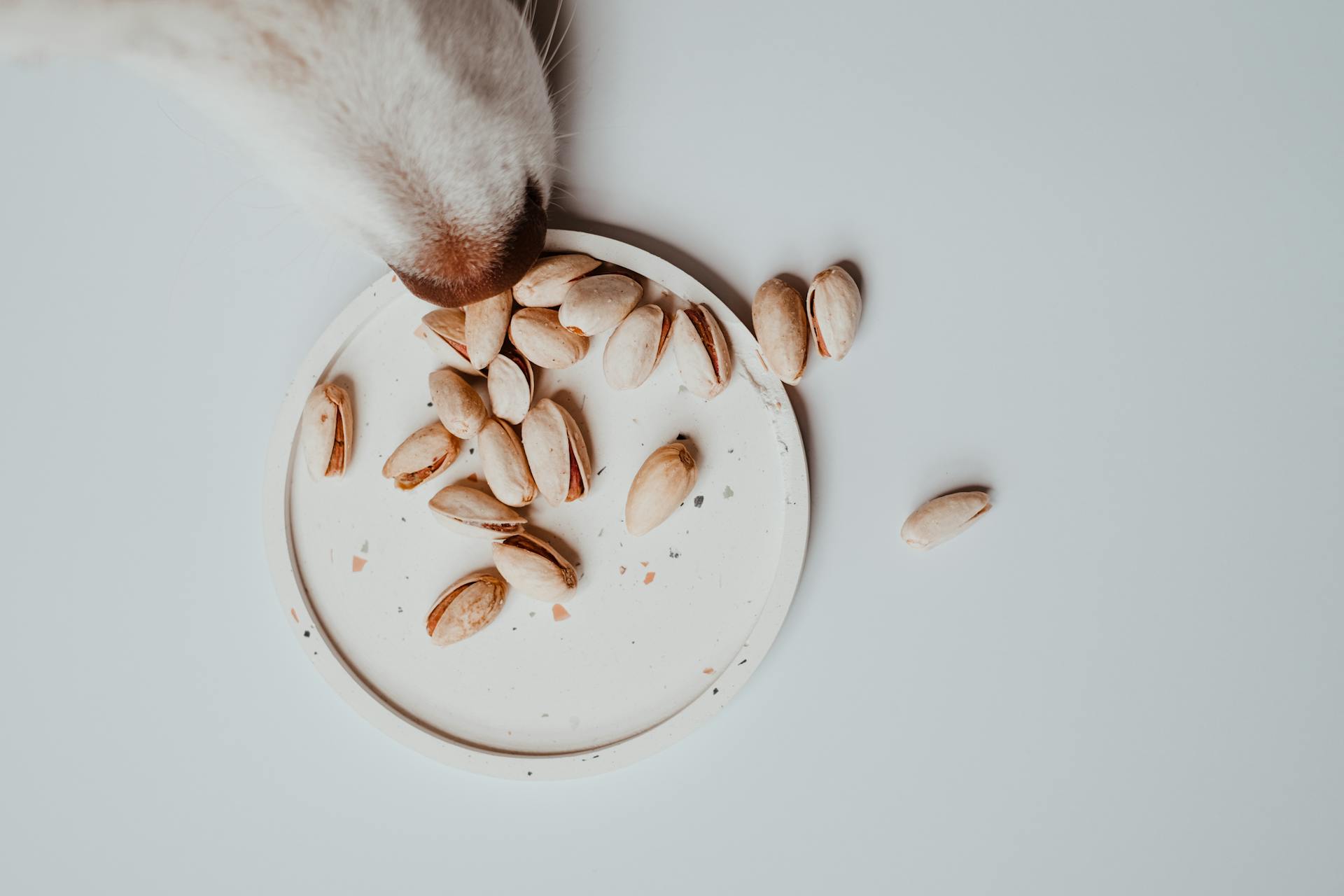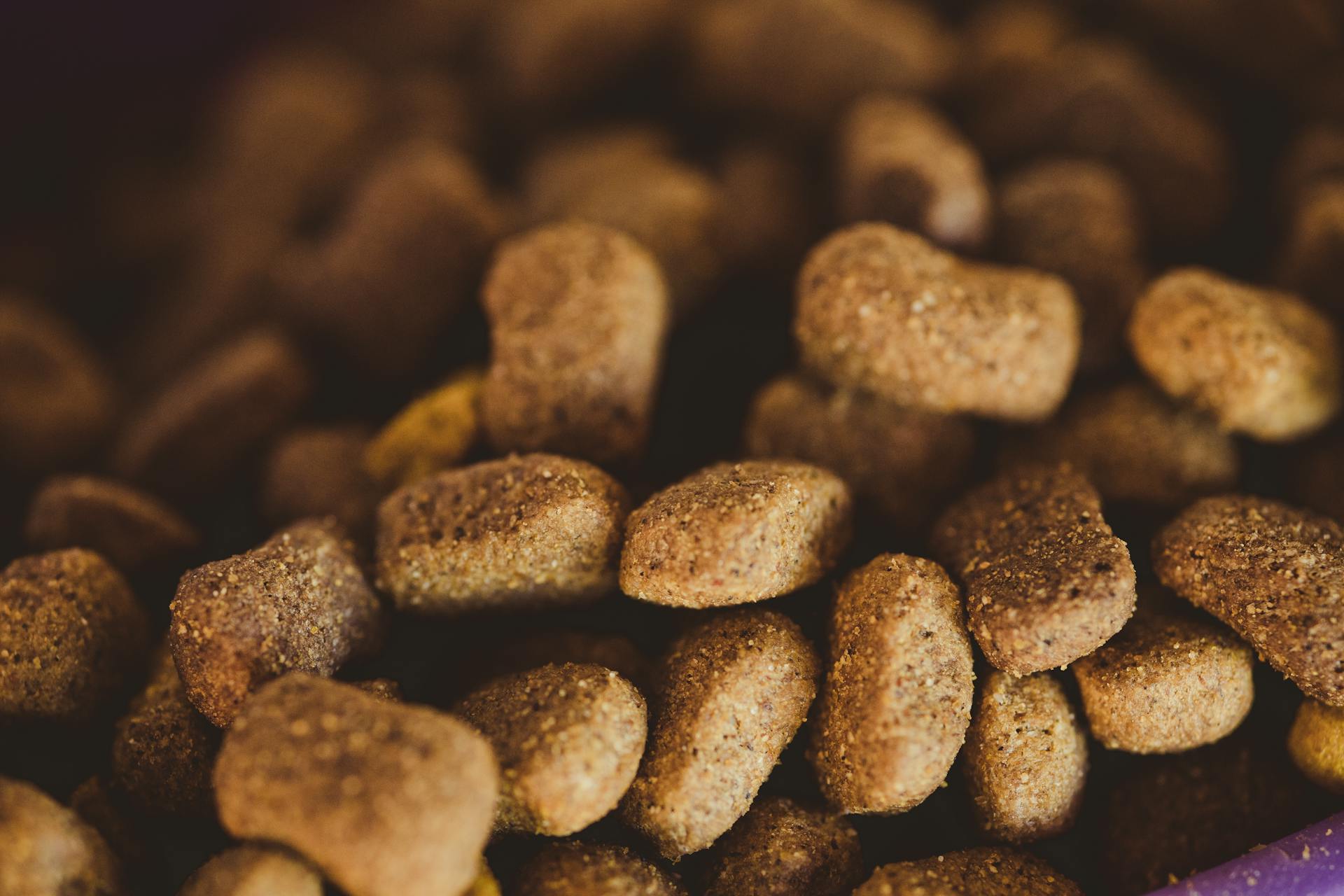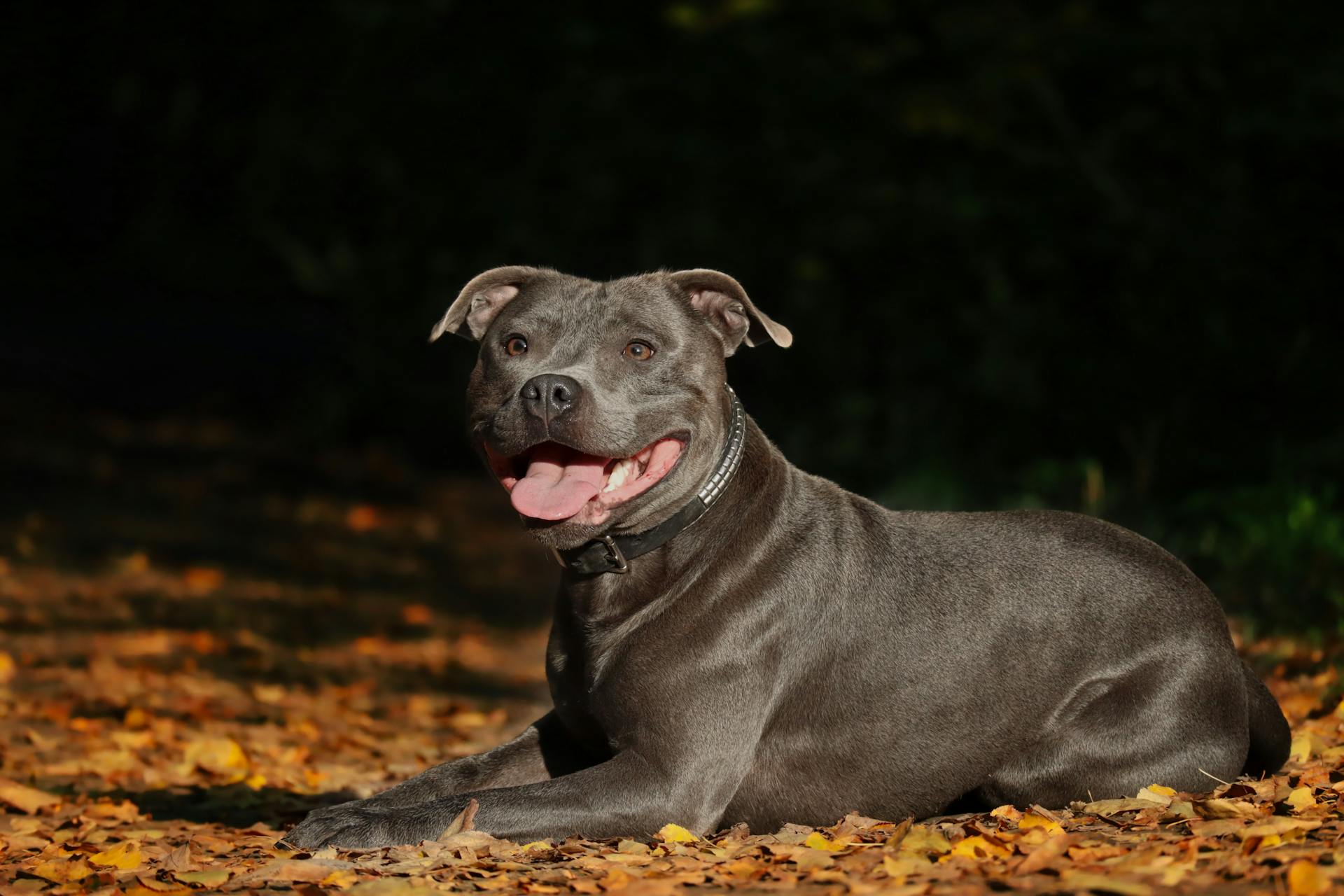
When making changes to your dog's diet, it's essential to focus on whole, nutrient-dense foods that support their overall health.
Some of the best foods to include in your dog's cancer-fighting diet are fruits and vegetables, such as berries, leafy greens, and carrots.
Berries are particularly beneficial due to their high antioxidant content, which can help reduce oxidative stress and inflammation in dogs with cancer.
A well-balanced canine cancer diet should also include lean protein sources like chicken, fish, and eggs.
Nutritional Considerations
A dog with cancer needs a complete and balanced diet more than ever, providing all the necessary nutrients in the correct amounts. This means the diet should be tailored to meet their specific needs, taking into account factors such as appetite, cancer diagnosis, treatment approach, and concurrent medical conditions.
The ideal canine cancer diet is low in carbohydrates, with no more than 25% carbohydrate on a dry matter basis, as cancer cells prefer to thrive on carbohydrates. In contrast, cancer cells have a difficult time using fat as an energy source, so foods high in fat and low in carbohydrates may be beneficial.
Research suggests that dogs with cancer should eat a nutrient profile with 25-40% dry matter fat and 5% dry matter or greater of dietary omega-3 fatty acids. Omega-3 fatty acids have been shown to exert an anti-tumor effect.
Here are some key nutritional considerations for dogs with cancer:
Ultimately, the best diet for a dog with cancer is one that is tailored to their individual needs and preferences, and should be determined in consultation with a veterinarian.
Nutritional Changes to Consider
Cancer cells love carbohydrates, so it's best to limit them in your dog's diet. Research suggests that dogs with cancer should eat a nutrient profile with no more than 25% carbohydrate on a dry matter (DM) basis.
Higher levels of fat, on the other hand, can be beneficial for dogs with cancer. Foods that are relatively high in fat and low in carbohydrate may help starve the tumor and support the patient's overall health.
Increasing the amount of omega-3 fatty acids in your dog's diet may also have an anti-tumor effect. While more research is needed, a diet with 25-40% DM fat and 5% DM or greater of dietary omega-3 fatty acids may be beneficial.
Protein intake is also crucial for dogs with cancer. A diet with 30-40% DM protein can help maintain lean body mass and support overall health.
Here are some general guidelines for nutritional changes to consider:
Remember, every dog is different, and their nutritional needs will vary depending on their individual circumstances. Consult with your veterinarian to determine the best nutritional plan for your dog.
Foods to Avoid During Chemotherapy
Avoid feeding raw meat, bones, or eggs during chemotherapy, as a raw diet can increase the risk of gastrointestinal side effects, infection, and sepsis from chemotherapy.
If your pet has a low white cell count, a raw diet can put them at slightly increased risk of infection and/or sepsis.
There is no scientific proof to show that a grain-free diet will benefit pets with cancer, and grains are not proven to be the worst carbohydrates.
Changing your pet's diet suddenly, especially when they start chemotherapy, can lead to diarrhea and make it difficult for your veterinarian to determine if the diarrhea is related to chemotherapy or the diet change.
Pets with cancer are already undergoing other stresses and changes, so it's best to avoid sudden diet changes.
If you do need to change your pet's diet, it's best to gradually transition to the new diet over 3-5 days.
Here are some foods to avoid during chemotherapy:
- Raw meat
- Raw bones
- Raw eggs
- Sudden changes to your pet's diet
Dietary Components
High-quality lean protein is essential for maintaining muscle mass in dogs with cancer. It's full of amino acids, vitamins, and minerals that help keep your dog strong.
Cruciferous vegetables like cauliflower, broccoli, and Brussels sprouts are nutritional powerhouses for dogs with cancer. They contain over 200 glucosinolates that have been shown to inhibit the growth of cancer cells.
Mushrooms are another great addition to a dog's cancer-fighting diet. They have beta-glucans in their cell walls that work to stimulate lymphocytes, a big player in immune function.
Sardines are a great source of omega-3 fatty acids, which can help balance the often excessive omega-6 fatty acids in a dog's diet. Omega-3s can help reduce inflammation and promote overall health.
Berries like raspberries are also a great addition to a dog's cancer-fighting diet. They're packed with phytonutrients that can help prevent and treat cancer.
Here are some key dietary components to include in your dog's cancer-fighting diet:
Fats and oils are also essential for a dog's cancer-fighting diet. Look for healthy sources like fish oil and krill oil, which are rich in omega-3 fatty acids.
Recommended read: Olive Oil in Dogs Food
Cooking and Preparation
Cooking can be the key to unlocking nutrients in foods that are otherwise undigestible for dogs.
Some foods, like vegetables and mushrooms, contain cellulose in their cell walls that can be hard for dogs to digest.
Cooking these foods can make them more easily digestible, which helps dogs absorb more nutrients.
Chicken necks, a great source of calcium and phosphorus, can be cooked until their bones are soft and malleable.
Don't stop cooking too early, as brittle bones can break into sharp pieces that can be a choking hazard.
Cooking at lower temperatures is a safe option for your dog's food, as it minimizes the production of carcinogens.
Simmering, cooking in a crock pot or slow cooker, or using a pressure cooker or instant pot are all great ways to cook at lower temperatures.
Traditional methods of cooking meat, like grilling, smoking, and roasting, can cause carcinogens to develop.
Microwaving, steam roasting, or infrared grilling are better options for retaining nutrients while avoiding carcinogens.
Cooking at 212°F or lower is a safe temperature range, as it minimizes the production of carcinogens.
Suggestion: Dogs Eating Bones
Commercial vs Homemade
When choosing a diet for your dog, you have two main options: commercial dog food or a homemade diet. Commercial dog food is a convenient and widely available option, but it may not provide the optimal nutrients for your dog's specific needs.
Commercial dog food can be a good choice for dogs with certain health conditions, such as cancer, as it is often formulated to meet specific nutritional needs. For example, some commercial dog foods are designed to support the immune system and reduce inflammation.
However, a homemade diet can be a better option for dogs with cancer, as it allows you to tailor the diet to your dog's specific needs and preferences. By using fresh, whole ingredients, you can create a diet that is rich in antioxidants and other nutrients that can help support your dog's health.
Commercial Options
Commercial options for your furry friend's diet can be convenient and appealing, especially when you're busy or unsure about what to feed them. More than 90% of pet owners in the US and Australia feed their pets mostly or only commercial diets.
These diets come in various forms, including dry (kibble), canned, semi-moist, dehydrated, freeze-dried, or raw, and are often processed and packaged for long storage. They're also complete and balanced, meeting AAFCO standard nutrient profile requirements.
However, many commercial diets list a carbohydrate as the first ingredient, such as corn or wheat, which may not be ideal for dogs with cancer. As a pet owner, it's essential to be aware of these ingredients and consider their impact on your dog's health.
The good news is that there's one commercial food designed specifically for dogs with cancer: Hill's Prescription Diet ONC Care. This new product, released in March 2023, includes highly digestible proteins and high levels of essential amino acids, as well as prebiotics to support the microbiome.
Here's a quick rundown of the AAFCO guidelines for commercial dog diets:
- Commercial dog food manufacturers can meet AAFCO's minimum nutrition amount guidelines by either formulating the food to meet AAFCO nutrient profiles or performing feeding trials.
- Feeding trials require at least eight dogs to maintain their body weight and have no significant changes in four basic blood parameters during a six-month trial.
Homemade
Making your dog's food at home can be a great way to give them fresh, whole food ingredients that taste better to them, which can help counter cachexia and increase their quality of life.
However, homemade diets can easily be unbalanced and/or incomplete if they come from untested sources, like social media or word-of-mouth, or without a recipe.
Aafco Commercial Guidelines
Almost all commercially available dog foods meet the minimum nutrition amount guidelines set by the Association of American Feed Control Officials (AAFCO).
Dog food manufacturers can meet these guidelines by either formulating the food to meet AAFCO's nutrient profiles or by conducting feeding trials aligned with AAFCO's guidelines.
The AAFCO minimums for adult dog food are 18% protein and 5% fat.
Higher protein (closer to 40%) and moderate fat (about 15-20%) may be a better target for canine health.
To meet AAFCO's guidelines, manufacturers can either do the math when creating the recipe or analyze the finished diet to confirm it contains the required nutrient levels.
Feeding trials require at least eight dogs to maintain their body weight and have no significant changes in four basic blood parameters during the six months of the trial.
Here's a summary of the AAFCO minimums for adult dog food:
Health Conditions and Treatments
Starting your dog on a dog cancer diet is a common approach, whether that's a new commercial food, a homecooked diet, or something in between.
A dog cancer diet can be a vital part of your dog's treatment plan, and it's essential to work with your veterinarian to determine the best course of action for your dog's specific needs.
Some dogs may benefit from a commercial dog food specifically formulated for cancer patients, while others may do better with a homecooked diet that's tailored to their individual needs.
Health Conditions
Dogs with preexisting conditions, such as kidney disease, pancreatitis, or allergies, can impact their cancer treatment, including diet.
Kidney disease can be a challenge when it comes to providing optimal nutrition for your dog with cancer. This is because dogs with kidney disease may need to follow a special diet that limits certain nutrients.
Pancreatitis, on the other hand, requires a diet that's easy to digest. This means avoiding foods that can irritate your dog's pancreas.
Allergies can also affect your dog's diet, and in some cases, may require a hypoallergenic diet.
You might enjoy: Canine Pancreatitis Diet Recipes

In some cases, your dog may show no outward signs of illness, but their metabolism may still be changing due to cancer. This is known as the preclinical phase, where there may be alterations in some blood test parameters, but no signs of cancer are evident.
Dogs in the preclinical phase may not show any clinical signs of cancer, but their metabolism is still changing. This makes it essential to provide optimal nutrition to support their quality of life.
Here are some common health conditions that can impact your dog's cancer treatment:
- Kidney disease
- Pancreatitis
- Allergies
Comparing Other Health Conditions
Pancreatitis can be deadly, resulting in death within a few days.
Kidney and liver failure generally kill dogs much quicker than cancer does.
Allergies might not kill a dog, but they make them miserable.
Your veterinarian will be able to explain to you the timelines involved in each of your dog's health issues, to help you understand why dietary modifications away from cancer-fighting foods and towards foods that support organs will help your dog.
Omega-3 fatty acids are part of the management plan for cancer, kidney disease, and allergies.
Broaden your view: Canine Kidney Cancer
Pet Care During Chemotherapy
During chemotherapy, it's essential to prioritize your pet's nutritional needs to help them navigate the treatment process.
Your pet's diet should be nutritionally complete and balanced, such as a balanced commercial diet like Hills or Royal Canin, which is suitable for their breed and age.
Avoid feeding raw meat, bones, or eggs during chemotherapy, as they can increase the risk of gastrointestinal side effects and infection.
Changing your pet's diet suddenly can cause diarrhea and make it challenging for your veterinarian to determine if the diarrhea is related to chemotherapy or the diet change.
It's best to gradually transition to a new diet over 3-5 days, especially if you're changing your pet to a bland diet.
A high-fat food like Hills a/d may be prescribed by your veterinarian, but it's generally recommended to avoid high saturated fat foods like bacon, bones, sausages, and hamburgers, even if your pet is not eating well, to prevent gut upset and pancreatitis.
For your interest: How to Switch Your Dogs Food
If your pet has a low white cell count, they may be at increased risk of infection and/or sepsis, making a raw diet even more hazardous.
Here are some general guidelines to keep in mind:
By following these guidelines, you can help ensure your pet receives the best possible nutrition during chemotherapy and supports their quality of life.
Frequently Asked Questions
Can dogs with cancer eat oatmeal?
Yes, dogs with cancer can eat oatmeal, which is a lower-glucose carb option that may help support their energy needs. However, consult with your veterinarian to determine the best diet for your dog's specific cancer treatment and needs.
How to slow tumor growth in dogs?
Calcium chloride injections have been shown to reduce tumor size in dogs, while other non-invasive methods and chemical solutions have also been used successfully to slow tumor growth
What cooked food is good for dogs with cancer?
For dogs with cancer, consider cooked dark meat chicken, salmon, and eggs as protein sources, paired with easily digestible green vegetables like spinach and broccoli. Cooking these foods fresh and non-farmed is also crucial for optimal canine nutrition.
What diet is best for dogs with lymphoma?
For dogs with lymphoma, a balanced and nutrient-rich diet that includes moderate protein and fat, along with complex carbohydrates, is recommended to support their overall health and well-being. A veterinarian can help determine the best diet for your dog's specific needs.
How do you slow down lymphoma in dogs?
For dogs with lymphoma, prednisone can be used to temporarily reduce symptoms and buy time, but it doesn't treat the underlying condition. Chemotherapy is often the most effective way to slow down lymphoma in dogs, but it may not be suitable for all pets due to various factors.
Sources
- https://www.monicasegal.com/cancer.html
- https://www.tosvets.com/services/Nutrition-for-the-Canine-Oncology-Patient
- https://vcahospitals.com/know-your-pet/feeding-the-canine-cancer-patient
- https://www.dogcancer.com/articles/diet-and-lifestyle/dog-cancer-diet/
- https://www.thepetoncologist.com/blog/nutrition-in-pets-with-cancer
Featured Images: pexels.com


